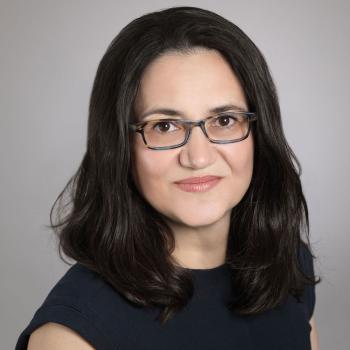Neuro-Oncology Branch staff scientist is recognized for her research on the disparities in neuro-oncology clinical trial access across the United States.
Rebecca Zacuto, Communications Fellow
November 17, 2023
On November 17, Orieta Celiku, Ph.D., a staff scientist at the NCI Center for Cancer Research’s Neuro-Oncology Branch (NOB), received the Abstract Award for Excellence in Healthcare Equity from the Society for Neuro-Oncology (SNO) during their 2023 Annual Meeting. This award recognizes the meeting’s top scientific abstract addressing health equity. Dr. Celiku’s award-winning research focuses on disparities in access to neuro-oncology clinical trials and trial-supporting infrastructure across the United States.
“The Society for Neuro-Oncology is committed to expanding access to clinical trials and improving equity in brain tumor care, which ultimately will result in more innovative science,” says Charles (Chas) Haynes, J.D., SNO executive director. “SNO is pleased to recognize Dr. Celiku’s work in this important area.”
“I am very honored,” Dr. Celiku says. “This project has been dear to me for many years. It’s very exciting that this work is being recognized for its potential to help move the field forward.”
Dr. Celiku’s winning abstract builds on her recent research analyzing the landscape of neuro-oncology clinical trials and assessing trends in accrual and barriers to participation. Working with former NOB Postbaccalaureate Fellow Yeonju Kim, Dr. Celiku discovered geographic and socio-economic barriers that affect clinical trial access in the United States. For example, there is a concentration of clinical trial sites in urban areas and socioeconomically advantaged regions. This inequity means that people outside of these regions are likely to remain underserved.
Dr. Celiku and Kim also found that a large proportion of neuro-oncology trials fail to meet their enrollment goals. With these two findings, they sought to better understand whether the existing healthcare infrastructure is capable of supporting the expansion of neuro-oncology clinical trial offerings.
In their most recent research, Dr. Celiku and Kim found that these disparities in trial site access reflect broader issues with the neuro-oncology and cancer care infrastructure. The urban-rural disparities are apparent across the networks of providers and collaboratives, such as the NCI’s National Clinical Trials Network and Community Oncology Research Program (NCORP). In more encouraging findings, the research indicates that NCORP and general oncologists reach more socioeconomically diverse populations.
“Efforts to ensure equitable access to clinical trials are paramount,” says Terri Armstrong, Ph.D., NOB deputy chief, study co-investigator, and chair of the Center for Cancer Research (CCR) Committee for Clinical Trial Diversity, Equity, and Inclusion. “These efforts should include best practices of broadening clinical trial eligibility, engagement in communities, expanding access to clinical trials, and improving the clinical trial infrastructure for neuro-oncology clinical trials." This is key to supporting the brain and spinal cord tumor patient community.
Two options to bridge access barriers include increasing telehealth options and utilizing decentralized trial designs—allowing clinical trial activities to take place closer to a participant’s home. Given the rarity of brain and spinal cord tumors, it is pivotal to create evidence-based strategies to overcome structural barriers to clinical trial participation and clinical care.
“This study underscores the national challenges in clinical trial accrual, which is so critical for completion of these studies of new therapies,” says NOB Chief Mark Gilbert, M.D. “Equally important is the need to ensure access to all patients so that the study results represent all members of the population.”
“Receiving this award is an acknowledgment of how important it is to have a clear picture of these gaps in infrastructure,” Dr. Celiku says. “This problem will not be organically solved. Efforts must be made to target these areas that are severely underserved.”
Looking ahead, Dr. Celiku is hopeful that collaborating with other health equity researchers in neuro-oncology will help develop novel approaches to bring clinical research and clinical care to a broader population. The mere existence of the SNO Abstract Award for Excellence in Healthcare Equity, she says, demonstrates not only an awareness of growing disparities, but a dedication and willingness to tackle these challenges in innovative ways.
Read more Neuro-Oncology Branch News >
